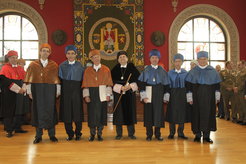Professor Ignacio Cirac receives the Honorary Doctor from the University of Zaragoza
The University of Zaragoza, which is the capital of the Spanish province Aragon, has given the honorary title of a “doctor honoris causa” to Professor Ignacio Cirac, Director at the Max Planck Institute of Quantum Optics (Garching, near Munich) and leader of the Theory Division.

The price ceremony took place on June 26th, 2014, when the medal and the certificate were handed over by the university’s rector, Prof. Manuel López Pérez. “It is a real pleasure and honour for me to receive the honorary doctor from this old and venerable university which has a long tradition and plays an important role in the academic life throughout in Spain,” says Prof. Cirac. “Furthermore, my parents, who have had a great influence on my career in science, have strong connections to the region of Aragon.”
The University of Zaragoza has its beginning in the7th century; for hundreds of years it served as an Ecclesiastical School of “General Arts” where literature, philosophy and theology were taught. In 1583 the institution was given the status of a university with all rights and privileges by the Spanish Crown. Today, about 38.000 students and 3000 scientific members work at five locations, covering 22 faculties in natural sciences, humanities, medicine and economics. The university is eager to sustain contacts and exchange programs with foreign universities, in particular in other European countries.
The connection of Prof. Cirac to the University of Zaragoza goes back to the year 1997, when he was involved in organizing a workshop on the emerging field of quantum information which took place at the Centro de Ciencias de Benasque Pedro Pascual, located at the heart of the Pyrenees. His intense cooperation was a strong contribution to establishing this place as a high rank science centre.
At the centre of Prof. Cirac’s research is the development of a new information theory based on the laws of quantum mechanics. New ways of controlling the world of atoms, molecules, and photons are being explored in order to exploit their quantum mechanical properties for storing and communicating quantum information with ever higher efficiency and security. These investigations are leading to new concepts for quantum computers – devices based on a system of quantum particles that serve to store and encode information. The Theory Division of Prof. Cirac has for example developed new concepts for logical elements such as quantum gates that have already been implemented by experimental physicists. Furthermore, the group develops new algorithms for quantum communication, designs new quantum networks making use of the special properties of quantum particles, and creates new theoretical tools to characterize and quantify e.g. entanglement of remote quantum systems.
Another strong focus of his theoretical research is the simulation of the behaviour of quantum many-body systems with ultracold atoms in optical lattices. For example, such systems can serve as models for solid states crystals. This work will lead to a better understanding of macroscopic phenomena such as magnetism and superconductivity, but it also aims at getting a deeper understanding about the true nature of light and matter.
Information on the person:
Professor Ignacio Cirac was born in the City of Manresa in 1965. He studied theoretical physics at the Universidad Complutense de Madrid where he received his PhD in 1991. He began his career in physics as a “Professor Titular” at the Universidad de Castilla-La Mancha where he stayed till 1996. In 1996 he became Professor at the department of Theoretical Physics at the University of Innsbruck. Here he began his strong scientific collaboration with Professor Peter Zoller. Since 2001 he is Director at the Max Planck Institute of Quantum Optics and head of the Theory Division.
Professor Ignacio Cirac has by now become one of the most renowned scientists in the field of quantum information and quantum computation. E.g., in 2005 he was awarded the “Quantum Electronics Prize” of the European Science Foundation. In May 2006 he was the youngest ever winner of the renowned Royal Spanish Prince of Asturias Prize, and in the same year he received the International Quantum Communication Award together with Professor Peter Zoller. In 2009 he shared the “Frontiers of Knowledge Award in Basic Sciences” of the Spanish BBVA Foundation as well as the Benjamin Franklin Medal of the Franklin Institute in Philadelphia (USA) with Professor Peter Zoller. In January 2013 he received both the Israeli Wolf Prize and the Niels Bohr Medal. Olivia Meyer-Streng
